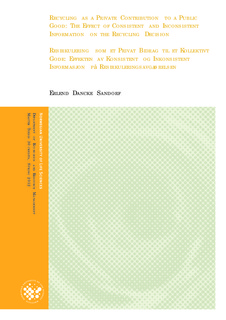| dc.description.abstract | The purpose of this thesis is to look at the effect of information in the voluntary private
provision of public goods when this information is consistent or inconsistent with prior
beliefs. The thesis develops a model using the utility maximization framework to look at how information affects the allocation of time between work, recycling and leisure. The analytical results provided by the model shows that when new positive and consistent
information is made available, the group for which I can sign the effect of information
consists of individuals in the medium income range. When new negative and consistent
information is made available, the group consists of individuals with medium and high
income. If the information is inconsistent, the model, as it is, predicts the effect of the new
information if we know that the information will be incorporated and heeded by the
individual. This represents a situation where the public good is provided privately. Introducing pricing instruments represents a situation where the government provides the public good and change the composition of the group for which I can sign the effect. In the case of a subsidy the income range for which I can sign the effect of information becomes smaller, and in the case of a tax, it becomes larger. The thesis offers the explanation that this is because a tax is a stronger incentive instrument than a subsidy. Formålet med denne oppgaven er å se på effekten av informasjon på private bidrag til
kollektive goder når denne informasjonen er konsistent eller inkonsistent med tidligere
holdninger og handlinger Et kollektivt gode er per definisjon ikke-rivaliserende og ikke-eksluderbart i forbruk (Randall,
1983). Et rent miljø er et eksempel på et slikt gode. Det private tilbudet av et kollektivt gode,
eller bruken av en felles ressurs, er ofte omtalt som et sosialt dilemma. En vanlig antakelse I
økonomiske modeller er at individer i en økonomi er egoistiske, nyttemaksimerene og kun bryr seg om sin egen uttelling. Økonomisk teori spår at et kollektivt gode vil bli tilbudt i for
liten grad dersom en kun baserer seg på frivillige bidrag (Bergstrom et al., 1986).
I motsettning til hva økonomisk teori sier, så kan vi observere at folk bidrar frivillig til
kollektive goder igjennom veldedighet, frivillig arbeid og resirkulering. Denne oppgaven
fokuserer på resirkulering. | no_NO |
